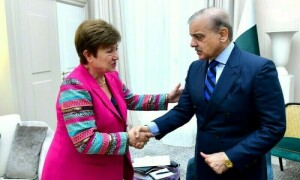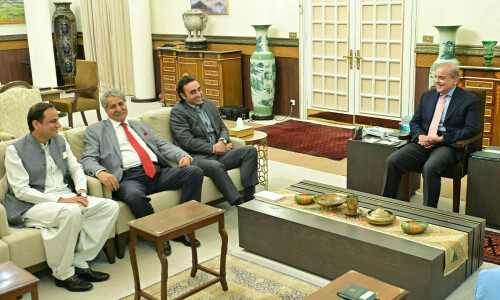
THIS is with reference to the article ‘The budget and after’ (July 3), which rightly presented a strong case against the negative impact of fresh and dispropor-tionate taxes imposed by the recent budget on salaried individuals. Simply put, the government has badly failed in fulfilling the promises it had made to the people, claiming that this time the budget would be different from the previous ones, and it would be in favour of the masses.
The budget, instead of bringing some respite for the have-nots from the undue inflation for which they are the least responsible, has once again added to their agony by imposing additional levies on electricity, petrol, diesel, grocery items, property, etc. The major reason behind the surge in taxes is to secure a new deal with the International Monetary Fund (IMF) to somehow keep the national economy afloat.
The fault lines in the current power system have been made clear by the disastrous budget, with the government’s consistent unwillingness to put an end to the exemptions it continues to provide to the civil and military bureaucracy. Similarly, the retail and agriculture industries, which hold significant political sway, are excluded from the imposition of taxes.
Some exemptions have been removed, thanks to the IMF insistence, but still, there is an endless list of protections that have not been taken away. Flawed policies are holding back the economy. We need a change that benefits the people at large, not just the privileged.
It is outright irrational to grind the impecunious families under the weight of new taxes for securing an IMF package. The government should bring the rich and powerful within the tax net, too, in order to lessen the burden on the poor.
Moreover, the government should retrospect and must learn from past incidents to know why every year every government has to knock at the IMF’s door to keep the tottering economy afloat. Despite the claims of the budget being public-friendly and an attempt to minimise hardships, it has severely impacted the poor and small businesses.
The consequences of this skewed system are far-reaching. These unjust taxes further strain the already tight budgets of middle class families. Money meant for groceries, rent or education gets diverted to the government coffers, pushing many closer to the financial brink. This stifles economic growth, as these families have less disposable income to spend.
Time is of utmost essence in this critical matter. The government and opposition parties should stop blaming each other for the fathomless abyss the country is in, and should make collaborative, sincere and extraordinary efforts to take the country somehow in the direction of economic growth and mass prosperity.
Ahmad Malik
Lahore
Published in Dawn, July 20th, 2024











































Dear visitor, the comments section is undergoing an overhaul and will return soon.